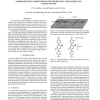Free Online Productivity Tools
i2Speak
i2Symbol
i2OCR
iTex2Img
iWeb2Print
iWeb2Shot
i2Type
iPdf2Split
iPdf2Merge
i2Bopomofo
i2Arabic
i2Style
i2Image
i2PDF
iLatex2Rtf
Sci2ools
104
click to vote
ICCAD
2003
IEEE
2003
IEEE
A Probabilistic-Based Design Methodology for Nanoscale Computation
As current silicon-based techniques fast approach their practical limits, the investigation of nanoscale electronics, devices and system architectures becomes a central research priority. It is expected that nanoarchitectures will confront devices and interconnections with high inherent defect rates, which motivates the search for new architectural paradigms. In this paper, we propose a probabilistic-based design methodology for designing nanoscale computer architectures based on Markov Random Fields (MRF). The MRF can express arbitrary logic circuits and logic operation is achieved by maximizing the probability of state configurations in the logic network. Maximizing state probability is equivalent to minimizing a form of energy that depends on neighboring nodes in the network. Once we develop a library of elementary logic components, we can link them together to build desired architectures based on the belief propagation algorithm. Belief propagation is a way of organizing the glob...
Arbitrary Logic Circuits | Elementary Logic Components | Elementary Logic Examples | Hardware | ICCAD 2003 |
Related Content
| Added | 16 Mar 2010 |
| Updated | 16 Mar 2010 |
| Type | Conference |
| Year | 2003 |
| Where | ICCAD |
| Authors | R. Iris Bahar, Joseph L. Mundy, Jie Chen |
Comments (0)

